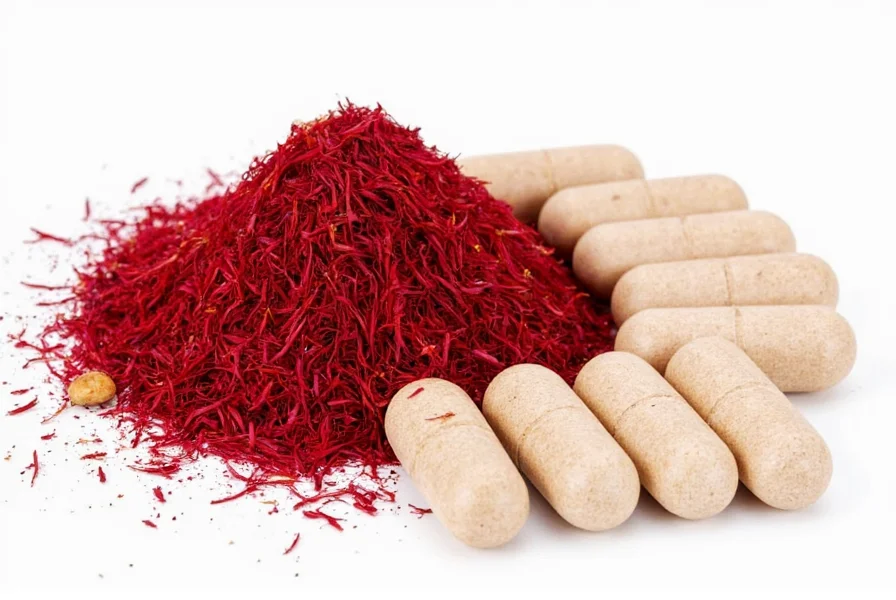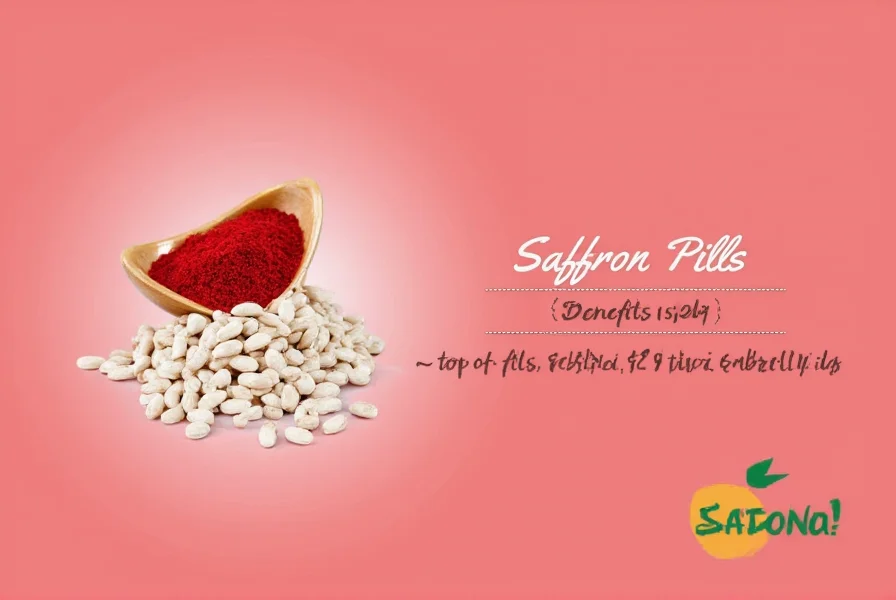Saffron pills have gained significant attention in the supplement market as researchers continue to investigate the potential health benefits of this ancient spice. Unlike culinary saffron used in cooking, these supplements contain standardized extracts designed to deliver consistent concentrations of active compounds like crocin, crocetin, and safranal. Understanding what saffron pills actually offer based on scientific evidence—not marketing claims—is essential for making informed decisions about incorporating them into your wellness routine.
What Exactly Are Saffron Pills?
Saffron pills contain concentrated extracts from the dried stigmas of the Crocus sativus flower, commonly known as saffron. Each capsule typically delivers 15-30 mg of standardized saffron extract, which is significantly more concentrated than what you'd consume through culinary use. The most clinically studied saffron supplements use patented extracts like Affron® or Satiereal® that guarantee specific percentages of key bioactive compounds:
| Active Compound | Typical Concentration | Primary Function |
|---|---|---|
| Crocin | 2-3% | Antioxidant properties, mood support |
| Safranal | 0.5-1% | Neuroprotective effects, aroma compound |
| Picrocrocin | 1-2% | Contributes to bitter taste, potential benefits |
Evidence-Based Health Benefits of Saffron Supplements
Unlike many supplements with limited research, saffron pills have been subjected to numerous clinical trials. The strongest evidence supports these specific applications:
Mood Support and Depression Management
Multiple randomized controlled trials demonstrate that 30 mg daily of saffron extract shows comparable effectiveness to conventional antidepressants like fluoxetine (Prozac) for mild to moderate depression, with fewer side effects. A 2020 meta-analysis published in Human Psychopharmacology concluded that saffron supplementation significantly reduced depression scores compared to placebo. The mechanism appears related to saffron's ability to modulate serotonin, dopamine, and norepinephrine levels in the brain—similar to how prescription antidepressants work but through natural pathways.

Age-Related Eye Health Protection
Research indicates saffron supplements may help protect against age-related macular degeneration (AMD) and improve retinal function. A landmark study in the Investigative Ophthalmology & Visual Science journal found that daily 20 mg saffron supplementation improved retinal response in patients with early AMD after just 3 months. The antioxidant properties of crocin appear to protect photoreceptor cells from oxidative damage, potentially slowing vision deterioration.
PMS Symptom Reduction
For women experiencing premenstrual syndrome, saffron pills offer a promising natural option. In a double-blind, placebo-controlled trial, women taking 30 mg daily of saffron extract experienced significantly reduced PMS symptoms including irritability, headaches, and cravings compared to placebo. The effects became noticeable within the first menstrual cycle of use.
Understanding Proper Saffron Pill Dosage
Determining the right saffron supplement dosage requires understanding research protocols and product specifications:
- Standard research dosage: 30 mg daily of standardized extract (split into two 15 mg doses)
- Minimum effective dose: Studies show benefits begin at 15 mg daily for mood support
- Maximum studied dose: 50 mg daily (higher doses haven't shown additional benefits)
- Timing considerations: Morning dosing may provide more consistent mood benefits
It's crucial to check the actual saffron extract content rather than just the total capsule weight. Many products contain fillers or lower-quality extracts that won't deliver the same benefits as the extracts used in clinical studies. Look for products specifying crocin and safranal content percentages.
Safety Profile and Potential Side Effects
Saffron supplements are generally well-tolerated at standard doses, but understanding potential side effects is essential for safe use:
Common Mild Side Effects
At recommended doses (15-30 mg daily), some users report:
- Dry mouth (approximately 5% of users in clinical trials)
- Mild nausea when taken on empty stomach
- Temporary changes in appetite
- Rare cases of dizziness
Serious Safety Considerations
Certain populations should exercise caution or avoid saffron pills entirely:
- Pregnant women: High doses may stimulate uterine contractions; avoid unless specifically recommended by healthcare provider
- Individuals taking SSRIs: Potential for serotonin syndrome when combined with antidepressants
- People with bipolar disorder: May trigger manic episodes in susceptible individuals
- Before surgery: Discontinue at least 2 weeks prior due to potential blood-thinning effects
The European Medicines Agency considers saffron safe at doses up to 100 mg daily for short-term use (8 weeks), but most research shows no additional benefits beyond 30 mg daily. Long-term safety data beyond 12 months remains limited.
Choosing Quality Saffron Supplements
Not all saffron pills deliver equal benefits. When evaluating products, consider these quality indicators:
- Standardized extracts: Look for products specifying crocin (2-3%) and safranal (0.5-1%) content
- Third-party testing: Certifications from NSF, USP, or ConsumerLab indicate quality verification
- Extraction method: Water-based extracts preserve more active compounds than alcohol-based
- Origin transparency: High-quality saffron typically comes from Iran, Spain, or Greece
- Avoid: Products listing "safflower" instead of saffron (completely different plant)

Limitations of Current Research
While promising, saffron supplement research has several important limitations to recognize:
- Most studies have small sample sizes (typically 30-60 participants)
- Long-term efficacy data beyond 6-12 months is limited
- Research primarily focuses on specific standardized extracts, not all saffron products
- Optimal duration of use for different conditions remains unclear
- Individual response varies significantly based on genetics and health status
Saffron pills should be viewed as complementary to, not replacements for, conventional treatments for serious health conditions. They work best as part of a comprehensive approach that includes proper nutrition, exercise, and professional medical care when needed.
When to Consult Your Healthcare Provider
Before adding saffron pills to your regimen, schedule a consultation with your healthcare provider if you:
- Are taking antidepressants, blood thinners, or blood pressure medications
- Have a history of bipolar disorder or other mental health conditions
- Are pregnant, breastfeeding, or trying to conceive
- Have scheduled surgery within the next month
- Experience persistent symptoms that haven't improved with conventional treatments
Your healthcare provider can help determine if saffron supplements are appropriate for your specific health situation and monitor for potential interactions with other medications or supplements you're taking.
Frequently Asked Questions About Saffron Pills
How long does it take for saffron pills to work for depression?
Most clinical studies show noticeable mood improvements within 4-6 weeks of consistent daily use at 30 mg doses. Some participants report subtle changes in emotional regulation within the first 1-2 weeks, but significant antidepressant effects typically require a full month of regular supplementation. Individual response times vary based on metabolism, severity of symptoms, and other health factors.
Can saffron pills help with weight loss?
Research suggests saffron extract may support weight management by reducing snacking frequency and controlling appetite. A 2010 study in Nutrition Research found participants taking saffron extract experienced 55% less snacking and reported feeling fuller between meals compared to placebo. However, saffron supplements alone won't cause significant weight loss without accompanying dietary changes and exercise. The effect appears modest and works best as part of a comprehensive weight management strategy.
Are saffron pills safe for long-term use?
Current research indicates saffron supplements are safe for continuous use up to 12 months at standard doses (15-30 mg daily). Studies monitoring participants for 6-12 months show no significant adverse effects or development of tolerance. However, data on safety beyond one year remains limited. For ongoing use beyond 12 months, periodic breaks (2-4 weeks off every 6 months) may be prudent until more long-term research becomes available.
What's the difference between saffron pills and liquid saffron extracts?
Both forms deliver saffron's active compounds, but pills offer more consistent dosing and longer shelf life. Liquid extracts may provide faster absorption but are more susceptible to degradation from light and air exposure. Pills typically contain standardized extracts with guaranteed crocin and safranal percentages, while liquid products vary more in concentration. For most users seeking consistent therapeutic effects, standardized saffron pills provide more reliable dosing compared to liquid extracts.
Can I get the same benefits from cooking with saffron instead of taking pills?
Culinary use of saffron provides some health benefits but won't deliver the same therapeutic effects as supplements. You'd need to consume approximately 1.5 grams of saffron daily to match the 30 mg extract dose used in studies—that's about 30 times the typical culinary amount and prohibitively expensive. Cooking also degrades some heat-sensitive compounds. While adding saffron to your diet offers antioxidant benefits, therapeutic applications for mood, eye health, or PMS require the concentrated extracts found in supplements.











 浙公网安备
33010002000092号
浙公网安备
33010002000092号 浙B2-20120091-4
浙B2-20120091-4